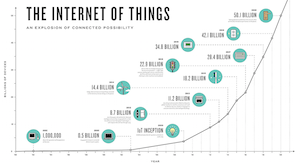
What the Internet of Things means for the accom industry
The Internet of Things (IoT) is a term referring to everyday objects that connect to the internet. The number of said objects is rapidly rising, and marketing firm Puzzle Partner recently compiled some ways accommodation providers may be affected over the next few years.
HOSPA forecast that by 2020, the number of devices per person connected to the internet will increase from one to 9. “Currently, 80 ‘things’ connect to the internet every second but we will see this figure rise to more than 250 ‘things’ connected to the internet every second in just the next few years,” Puzzle Partner added.
“This trend will have a huge impact on the travel and hotel industry, which are already major beneficiaries of new and future ‘connected’ innovations.”
Smart devices are first on the list. According to research by the SMA, two out of three people plan to purchase a smart home device in the next year. “These innovations are giving rise to similar IoT technologies for use in travel and hotels– for example, connected mini bars that feature removal sensors for auto-charging guests, and smart suitcases that can be tracked and monitored.
“Mobility and convenience are two shared critical components of travel and IoT, making them a natural fit. By taking advantage of IoT solutions currently on the market, hotel and travel companies can realise increased operational efficiency and more personalised guest experience.”
Facilities and operations
“Smart sensors in connected devices such as ‘smart’ thermostats, drop-cams, coffee makers, connected mirrors, robot butlers and smart lightbulbs can work together to automatically personalise environmental conditions for guests based on their proximity and movement patterns.
“Lighting and temperature can be automatically adjusted based on sensor data from IoT devices, increasing efficiency and eliminating waste. In the airline industry, gate agents can locate late passengers through NFC beacons, expediting departures.”
Personalised service delivery
“Travellers and guests can experience dramatic improvements in service with the latest ‘smart’ innovations. Hotels can automatically send electronic key cards to their guests’ mobile devices, providing a comprehensive self-check-in and room key service. Smart locks with NFC readers can allow guests to restricted access to facilities on demand for improved security. Moreover, for returning guests, hotels can save room preferences and automatically load them at each visit, ensuring all guests enjoy a consistent, customised experience.”
Logistics and security
“Hotels can track supply chains more efficiently through sensor-enabled shipments, allowing them to plan for any contingency and prevent service disruptions to guests. Hotels and airlines can also easily and more cost-effectively deploy security mechanisms in facilities and structures, with centralised management of these IoT-enabled cameras and proximity sensors possible from any desktop or mobile device.
“These IoT solutions are all available on the market now. Future IoT products and innovations will no doubt bring even more dramatic transformations in the travel and hotel industry. Companies should prepare by incorporating IoT into their current initiatives to take advantage of future innovations when they arrive.”

AccomNews is not affiliated with any government agency, body or political party. We are an independently owned, family-operated magazine.







